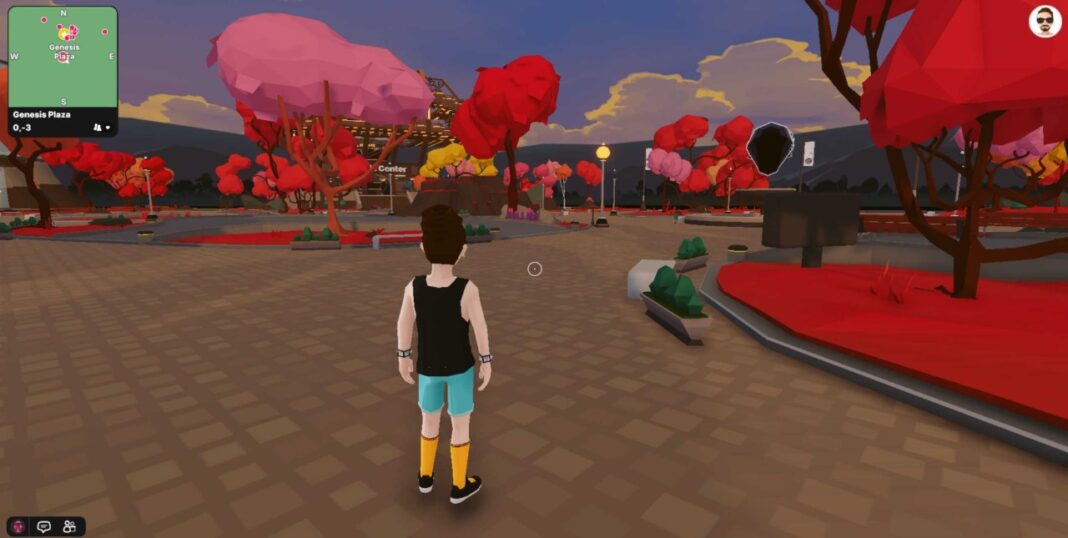Facebook’s decision to rename itself Meta Platforms (META 0.99%) ignited interest in the virtual worlds that make up the metaverse, a space that Meta CEO Mark Zuckerberg has described as an “embodied internet.” Along the way, sales of virtual real estate have boomed, creating a cottage industry with speculators scooping up parcels, and even big brands like Adidas and Nike are established their own Metaverse outposts.
However, there are several signs that interest in the metaverse is already starting to wane significantly and may never grow again.
General interest in the metaverse is declining as Google searches have fallen following a spike after Facebook announced its name change.
Also, Decentraland’s and Sandbox’s currencies have both seen a decline in value following Facebook’s rebranding announcement – and as I mentioned yesterday, almost no one is visiting their virtual worlds. Decentraland’s metaverse is the most popular of all the metaverses, but it is still empty, boring, and not very different from just another quickly made online game a teenager would toss away.
This has led to a lot of disappointment among users, who have been unable to find the same level of excitement and engagement in Decentraland that they experienced in other virtual worlds. So no one is going back..
Why is this happening? Is there a common reason that the Metaverse seems to have already collapsed before it even got off the ground? Companies are still preparing for the metaverse, investing billions into virtual- and augmented-reality technologies, but the transition to a new computing platform, as Zuckerberg has described it, could take longer than expected.
After all, there needs to be a compelling reason to join virtual worlds like Decentraland besides novelty interest.
They need to make work easier, provide entertainment, or offer some other significant advantage over the physical world.
So far, it’s not clear that any of these virtual worlds stand a chance of fulfilling that promise – nor do they even seem to be trying to. In the meantime, we’ll just have to keep living in the real world, where lawns still need to be mowed and bills still need to be paid.And that’s the big issue: business folks with a desire to ride the wave created the virtual words to make quick money from brands spending experimental budgets.
However, none of them actually are game designers, none of them have a passion for development nor really are trying to create a long-lasting product.I’ve mentioned more than a few times that I am fascinated with Roblox, a gaming platform that is enormously popular with younger children, with approximately half of its users aged 13 or under.
It’s fascinating because it seems to have done what Facebook WANTS to do, years ago. And continues to do well. Roblox allows kids to play games, interact with each other, and create their own worlds.
It’s like a mix of Minecraft and Second Life, but with less violence and more brightly colored graphics.
When it comes to socializing and gaming, there’s no denying that Gen Z knows how to have fun. So it’s no surprise that a socializing, tech-first gaming app like Roblox would gain so much popularity among them. In fact, just 14% of Roblox’s users are over 25 years old.
The majority of Roblox players (67%) are under the age of 16, so today’s youth are leading the way in this game and, in turn, the metaverse itself.
With such a huge user base of young people, it’s no wonder that Roblox is constantly evolving to meet their needs. From avatars and games to chat and social features, Roblox is constantly innovating to give its users the best possible experience.
Roblox is a game platform that allows for endless freedom and creativity. It’s a test bed for new ideas and concepts, and it’s also got its own ecosystems and economies.
The community is as much a part of the game as the technology, and it’s this community that makes Roblox a platform more than just a game. Roblox is constantly innovating and expanding, and it’s this willingness to experiment that makes it such an exciting place to be.
Whatever you can think of, you can make an experience with it, from complicated fighting games to just chilling out in your virtual living room. There’s even a fully explorable Hilton Hotels group (Bloxton Hotels in-game).
Roblox wasn’t created to just make advertisers happy and take money from them. It was created as a place for play, community, and engagement – and then both users and advertisers flocked to it, year after year.
I’m not sure these advertising companies understand how to build something as compelling as Roblox — where people choose to come together and hang out, have fun, and spend time together — without it feeling like cheesy, forced fun that’s just trying to keep you there for long enough to show you advertising.
It’s a delicate balance and one that I don’t think these companies have figured out yet. Or they don’t want to, because as I mentioned, they are looking for the easy money.
The key is to create an environment that is entertaining and engaging without being overwhelming or intrusive.
Otherwise, people will quickly get turned off and will go elsewhere. I think that’s why Roblox has been so successful — they’ve created a space that feels like a safe haven from the constant bombardment of advertising that we’re subjected to everywhere else.So did the Metaverse bubble burst? No — just the one that was created by shady companies looking to cash on a trend but not provide any value. Sandbox and Decentraland will likely just disappear unless they make radical changes from an advertiser-centric experiment to a real digital world that makes users want to come back.
What do you think? Is the Metaverse Gone already?




